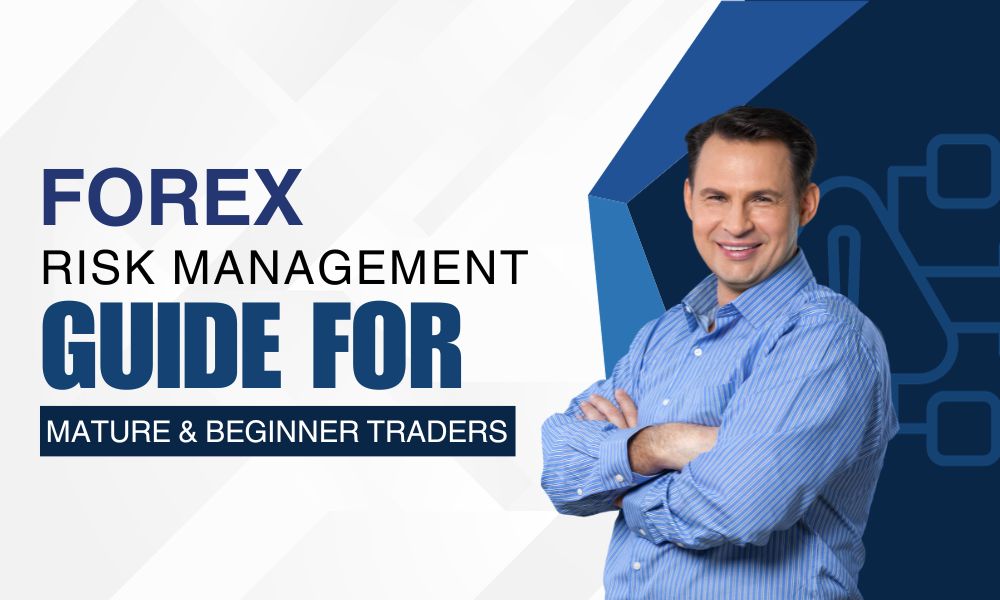In the ever-changing landscape of forex trading, managing risk is not just wise; it’s imperative. This guide unravels the intricacies of forex risk management, catering to traders of all backgrounds. Whether you’re a seasoned professional handling substantial portfolios or a newcomer taking your initial steps into the exciting forex market, understanding and applying effective risk management strategies is paramount for sustained success.
Understanding Forex Trading Basics
Forex trading involves the exchange of currencies, where traders capitalize on exchange rate fluctuations. It’s crucial to grasp the fundamentals: currency pairs, pips, leverage, and the vast global forex market. This foundational knowledge forms the basis for developing sound risk management strategies.
The Role of Forex Risk Management for Mature Traders
Experienced traders, often managing larger portfolios and retirement funds, face unique challenges. Preserving capital, mitigating risk exposure, and ensuring a stable income stream are top priorities. Effective risk management acts as a shield, safeguarding investments and providing stability against market volatility, ensuring financial security over the long haul.
Types of Forex Risk Management
- Stop-Loss Orders: These predefined orders limit potential losses by automatically closing a trade when a specific price level is reached.
- Take-Profit Orders: Conversely, these orders secure profits by closing a trade when a predetermined profit level is attained.
- Diversification: Spreading investments across different currency pairs reduces the impact of a poor-performing asset on the overall portfolio.
- Hedging: Hedging involves opening a position to offset the risk of another investment, acting as a form of insurance against adverse market movements.
- Position Sizing: Calculating the appropriate position size based on the trader’s risk tolerance and account size helps manage the overall risk exposure.
Best Forex Risk Management Strategy:
In this section, we have listed some of the best risk management strategies for forex trading. These strategies will help you improve your trading potential.
Acquiring a Solid Forex Education
Before immersing yourself in the world of Forex trading, it’s crucial to equip yourself with the right knowledge. There’s a plethora of free educational material available online. Websites like BabyPips.com offer in-depth guides, providing a comprehensive understanding of the market. Moreover, leading Forex brokers like Vault Markets offer extensive educational resources, laying a strong foundation before you start real-time trading.
Formulating a Well-Defined Trading Strategy
A well-structured trading strategy acts as your guiding light in the ever-changing Forex market. Avoid making impulsive decisions driven by emotions. Instead, develop a strategy with clear-cut rules for entering and exiting trades. Precisely knowing when to close a trade, be it for profit or loss prevention, prevents rash decisions influenced by fear or greed.
There are various trading strategies, both technical and fundamental, at your disposal. Select one that offers explicit guidelines for entry and exit, aligning with your risk tolerance and individual trading style. A clearly outlined strategy acts as a protective shield, ensuring logical decisions even amidst market fluctuations.
Maintaining a Beneficial Risk/Reward Ratio
A fundamental principle in Forex trading is maintaining a favorable risk/reward ratio, ideally 2:1 or higher. This ratio signifies that the potential profit is at least double the amount you risk in a trade. Adhering to this principle enhances the likelihood of profitable trades while minimizing potential losses.
By incorporating these essential guidelines, you can navigate the Forex landscape with prudence and confidence, ensuring your trades align with rational decision-making. Happy trading!
Tailored Risk Management Strategies for Mature Traders
For mature traders, diversification, hedging, and strategic asset allocation are advanced techniques. Diversifying investments across multiple currency pairs minimizes the impact of underperforming assets. Hedging strategies protect against adverse market movements. Staying informed about economic indicators and geopolitical events enhances decision-making capabilities, fortifying investments in the process.
Forex Risk Management Strategies for Beginner Traders
For beginners, mastering risk management is crucial. Setting stop-loss orders, practicing in demo accounts, and developing a well-defined trading plan are fundamental strategies. Stop-loss orders act as safety nets, limiting losses and preventing impulsive decisions. Demo accounts provide a risk-free environment for skill development and confidence-building. A structured trading plan guides beginners, preventing emotional trading, a common pitfall for novices.
Tools and Resources for Effective Risk Management
In the digital era, traders have access to various tools and resources. Risk management calculators, trading journals, and market analysis tools empower traders. These resources enable data-driven decisions, allowing traders to analyze trends, evaluate risks, and make informed choices. Discipline and adherence to these tools significantly enhance risk management strategies. Some broker platforms like Yunikon FX provide risk management resources.
Learning from Real-Life Experiences
Real-life case studies offer valuable insights. Stories of successful traders provide practical lessons. Understanding their strategies enables readers to gain inspiration and apply similar techniques. Learning from others’ experiences is a powerful way to internalize risk management principles, turning theoretical knowledge into practical wisdom.
Staying Informed and Adapting to Market Dynamics
In the ever-evolving forex market, staying informed is vital. Traders must continuously learn and adapt to market changes, regulations, and technological advancements. Adaptable risk management strategies empower traders to thrive amidst uncertainty. Being proactive, staying informed, and remaining flexible are essential traits for successful traders.
Conclusion
In the realm of forex trading, risk management is the linchpin of success. Mastering risk management empowers traders to safeguard investments, ensuring financial stability and resilience against market fluctuations. As you embark on your forex journey or refine existing strategies, remember that effective risk management is your compass.
By comprehending market intricacies, employing tailored risk management techniques, and staying informed, you can navigate the complexities of forex trading confidently. Transform risks into opportunities, losses into lessons, and pave the way for sustained success in the ever-vibrant forex market.

